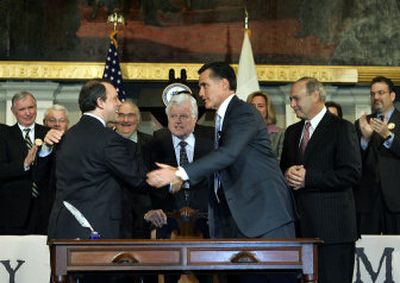Universal health insurance bill becomes law in Massachusetts

BOSTON – In the historic confines of Faneuil Hall, Massachusetts Gov. Mitt Romney signed groundbreaking universal health-care legislation Wednesday that promises to cover nearly all the state’s 515,000 uninsured residents by 2010.
In a packed ceremony in the chambers where the doctrine of “no taxation without representation” was born, Romney and the bipartisan leaders who crafted the bill sensed a watershed moment.
“An achievement like this comes around once in a generation,” Romney said. “Today, Massachusetts is leading the way with health insurance for everyone, without a government takeover and without raising taxes.”
The bill, which is the first to require all state residents to obtain health insurance, is being hailed as a possible blueprint for covering all Americans nationwide.
Some experts, however, aren’t so sure. They say the hybrid plan is a purely political fix with no practical applications outside the Bay State. The measure resulted from a federal threat to cut $385 million in Medicaid money unless the state reduced its ranks of uninsured.
Critics say that the new law lacks adequate funding and cost controls that would assure long-term success. They fear that Massachusetts’ exorbitant health-care costs and the dearth of affordable health plans ultimately could derail the measure, much the same way that opposition from the business community helped kill a 1988 law that also sought statewide universal health coverage.
“We will look back at this new legislation as a well-motivated but naive, underfunded political approach,” said Alan Sager, a co-director of the Health Reform Program at Boston University’s school of public health.
The new law requires people who don’t have health insurance to buy it by July 1, 2007, or forfeit their individual state tax exemptions. Private insurance companies, working with state officials, will develop low-cost plans that people can purchase on a pretax basis through a new state-run insurance exchange. The price isn’t set yet, but state officials hope it will be about $200 a month.
Money that the government had spent to assist the uninsured will go to help needy residents pay for coverage. People who don’t buy insurance after the second year would have to pay fines equal to half the cost of an affordable plan.
The new legislation also increases payments to hospitals and doctors and expands coverage for poor children through Medicaid.
The plan will cost about $1.3 billion in public and private funding a year, but only $125 million will be new state money. The remainder will come from some new funds and a relocation of existing money, including $650 million in federal funds, $320 million from insurance companies and hospitals and $50 million from penalties on businesses that don’t provide insurance.
By combining elements of personal responsibility, government support and strong coverage mandates for employers, the plan offers something for people of all political ideologies.
That diversity of design spreads the coverage burden among residents, businesses and the government. It also helped the bill overcome long odds to draw nearly unanimous support from state lawmakers, who passed it last week.
“At long last, the impossible dream of health care for all will finally become a reality in our commonwealth,” said U.S. Sen. Edward Kennedy, D-Mass.
Peter Brook, a 45-year-old construction worker and diabetes patient from South Boston, will get a government subsidy to help buy coverage because of his low income. With insurance, he’ll no longer have to reuse his insulin needles for months at a time or raid his 401K to pay for health care. But it’s unclear how much assistance he’ll receive, and he’s skeptical about whether it’ll be enough to help him buy a policy.
“I don’t have that full confidence that it’s all going to pan out,” he said. “I’m a realist.”
People who get no assistance also could have difficulty buying policies. Under the legislation, people who earn more than 300 percent of federal poverty levels – in other words, $28,700 for a single person and about $60,000 for a family of four – receive no financial help.
“If consumers are forced to pay for a policy that’s not affordable, there’s going to be another Boston Tea Party,” said Jamie Court, the president of the Foundation for Taxpayer and Consumer Rights, a consumer watchdog group in Santa Monica, Calif.